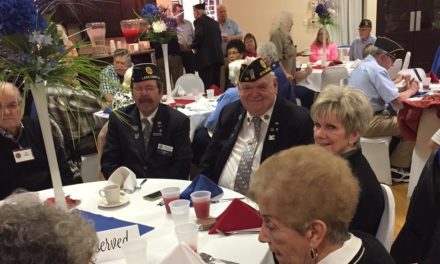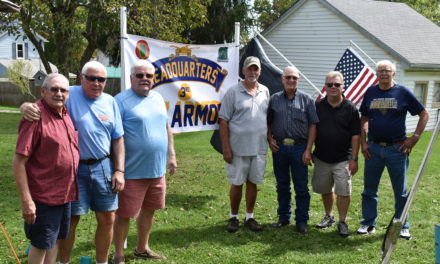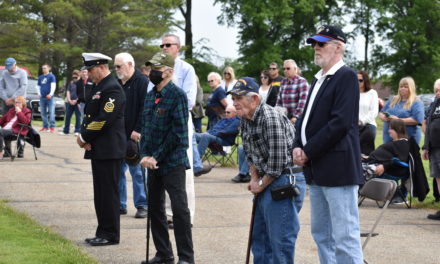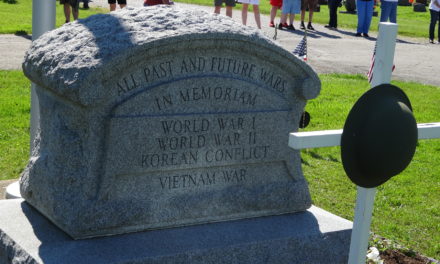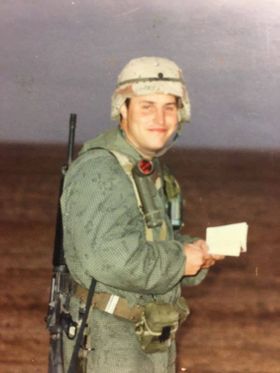
Tim Sydlowski is shown during his deployment to the Middle East for Operation Desert Storm. Contributed photo.
Much of the media attention placed on veterans returning from combat deals with those who have been diagnosed with post-traumatic stress disorder and struggle with adjusting to civilian life.
War changed Tim Sydowski in a different way.
“There’s a different side of war than just killing and waving the flag,” the Brookfield man said. “I learned a lot about myself, what I wanted to be, how I wanted to live my life.”
The military was not something Sydlowski had ever aspired to.
“I had no inclination as a child to be a soldier,” he said. “In fact, I was trying to figure out how old I had to be before you weren’t eligible to be involved in a war.”
However, after graduating from Brookfield High in 1985, “the military seemed like my best bet,” Sydlowski said, figuring he would grow up by serving and enjoy the travel.
“I had no clue what I wanted to do with my life,” he said. “I got in the army from ’85 to ’88, and I hated it.”
While he enjoyed being stationed in Germany and seeing the sights there, many of them with World War II significance, “I was just so immature and so young,” Sydlowski said. “There was a lot of beer. It was strong beer. I wasn’t ready for it (service). I wish I was, like, later in life, because I would have appreciated it more and got more out of it.”
When he left the army in 1988, “I was no more set on what I wanted to do in my life, and, nine months later, I ended up going right back into it,” Sydlowski said. “The second time I went in, I loved it, absolutely loved it.”
Stationed in Fort Riley, Kansas, he loved the state and its laid-back people, he said.
Then, he learned he was going to the Persian Gulf for Operation Desert Storm. When he enlisted in ’85, America was in the Cold War, and he didn’t believe there was much chance he would see combat.
“I don’t want to sound immature, but I didn’t take it seriously,” he said of his training. “And then, all of a sudden, when things started going down, I started kicking myself, thinking, ‘Why didn’t I take this more seriously?’”
 Sydlowski was a member of Big Red Ones of the 1st Infantry Division, a unit founded by Gen. George Armstrong Custer and with a storied history of combat success. He was a surveyor, responsible for directing the targeting of howitzers and rocket launchers, a job that he said has largely been replaced by GPS units.
Sydlowski was a member of Big Red Ones of the 1st Infantry Division, a unit founded by Gen. George Armstrong Custer and with a storied history of combat success. He was a surveyor, responsible for directing the targeting of howitzers and rocket launchers, a job that he said has largely been replaced by GPS units.
He left behind the creature comforts of a bed, regular meals and beer for the desert’s blistering hot days and freezing cold nights, meals ready to eat and sleeping on the ground or with his head on the window of a Humvee.
His unit entered Iraq on Feb. 24, 1991, when the ground war commenced.
“We were supposed to die,” said the married father of two. “We heard that casualties were gonna be really, really bad, and the chemical weapons were supposed to be used on us. It’s weird the first time you see bullets flying over your head, tanks shooting at you. You don’t have time to be scared. Everything goes so fast.”
In this case, fast also applied to the duration of the fighting. In 100 hours, the U.S. and its allies took control of Iraq, and Sydlowski’s unit members found themselves handling prisoners of war, the same Iraqi soldiers he had been told would do terrible things to him if he had been captured. He had a much different response to them.
“They had no shoes, no food, no water,” he said, and he gave his supply of MREs to the POWS.
“I just pitched it out (MRE box), because they were starving,” said Sydlowski, who left the service in 1992. “I felt real, real good about that, and then everybody else started doing the same thing. I was more proud of how we handled the enemy than anything else. To this day, I’ve tried to live my life like that.”

